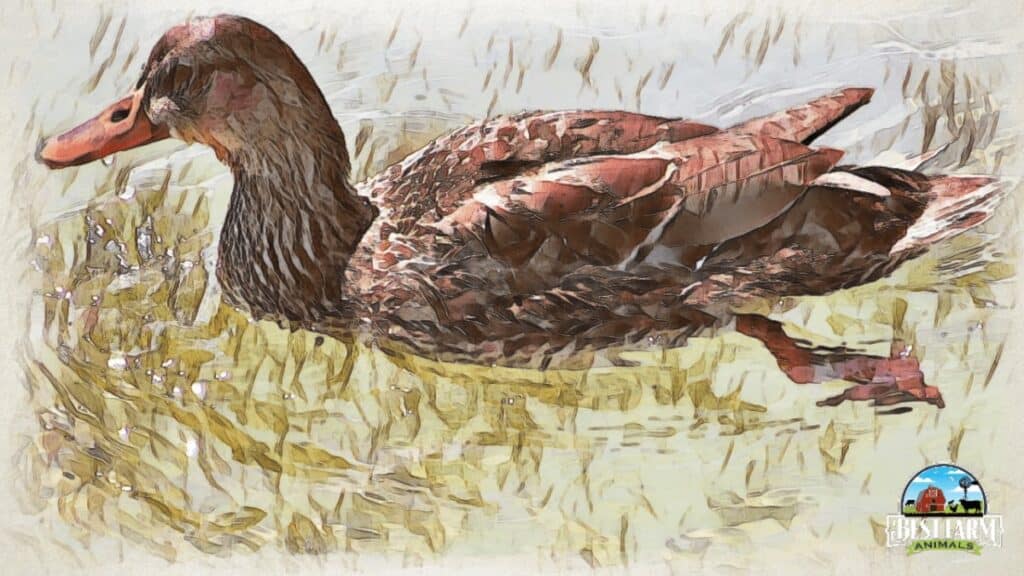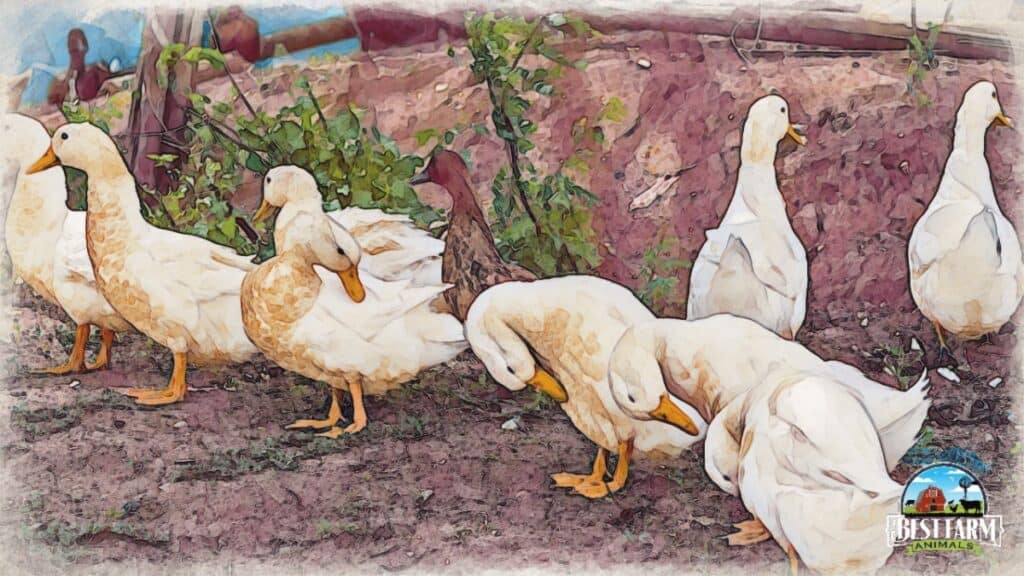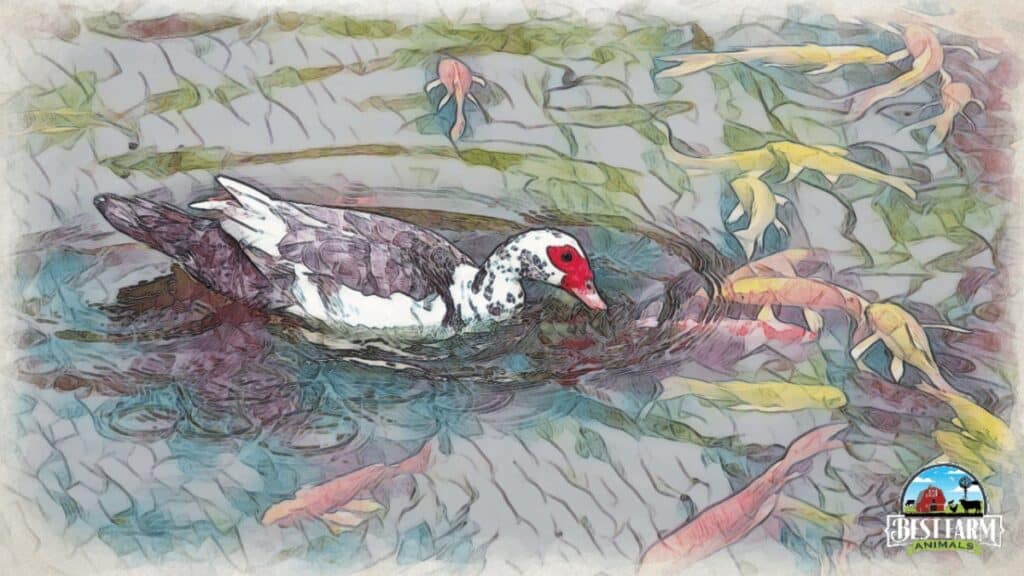Most pets need vaccinations to stay healthy. Even chickens are susceptible to a variety of diseases and illnesses. Duck owners often wonder if ducks need specific vaccinations because chickens, turkeys, and other fowl should be protected.
Do ducks need vaccinations? Pet ducks do not need to be vaccinated or dewormed unless they are exposed to wild ducks or kept in unclean conditions. Ducks are immune to most poultry diseases and seldom catch any illness unless raised in a factory, mass production situation, or are deficient in vitamins.
Some exceptions apply, which I’ll cover in this article.
A duck’s body temperature averages around 107 degrees Fahrenheit. Because their body temperature is higher than a chicken or turkey’s body temperature, they don’t get sick as often.
Most illnesses that make a chicken sick can’t survive on a duck. In addition, they spend a lot of their time in the water. As a result, ticks, mites, and other parasites that tend to bother chickens don’t usually survive long on a duck. They drown in the water or get washed away.
Available Duck Vaccinations
Ducks can suffer from both bacterial and viral diseases. You can prevent some of these diseases through vaccinations. You can prevent duck diseases through vaccines, including Duck Viral Hepatitis, Duck Plague, New Duck Disease, Newcastle Disease, Avian, and Cholera.
Many of these diseases are easily transmitted and can be passed from wild ducks to your flock. (Some of them make ducks more susceptible to parasites and worms.

1. Duck Viral Hepatitis Vaccine
Duck Viral Hepatitis is untreatable but is preventable through a vaccine using a weakened virus strain before the bird begins laying eggs. You can immunize your day-old chicks using the duck viral hepatitis vaccine. Ducks are generally given the shot under the skin of the foot.
Although this virus can infect adult ducks, scientists have not witnessed clinical signs in birds older than seven weeks. The best way to protect your birds against Duck viral hepatitis is through observance of strict biosecurity and isolation, especially for birds below five weeks old.
Duck viral hepatitis can infect ducks as young as two weeks old. The incubation period for DHAV (the virus that causes duck viral hepatitis) is between 18 and 48 hours, explaining why it can affect a large population of birds in a short time.
The affected birds will paddle spasmodically, lose balance, become lethargic, and may die in minutes. The mortality rate among ducklings infected with this virus is about 95%, and in most cases, the ducklings die within the first week of the infection.
Diagnosis of Duck Viral Hepatitis is presumptive based on lesions and history of the bird, but the confirmation of the diagnosis requires Polymerase chain reaction (PCR) or virus isolation.
Should I vaccinate my duck against Duck Viral Hepatitis? You probably don’t need to vaccinate your ducks against Duck Viral Hepatitis unless you live in an area where the virus is more prevalent, live close to commercial operations, or your ducks have regular interaction with wild ducks.
You can also prevent many duck diseases by following good husbandry practices; separate ducks from wild ducks, keep duck runs clean, provide clean water and quality food, and practice good biosecurity when you introduce new ducks to the flock.

2. Duck Plague (Duck Virus Enteritis) Vaccine
Duck Plague also called Duck Virus Enteritis (DPV-E) is a highly contagious and deadly disease that affects adult ducks, geese and swans. The virus attacks ducks’ digestive tract, leading to inflammation and vomiting, diarrhea, dehydration, weight loss, and even death.
The disease causes vascular damage and tissue bleeding, which causes the body cavities to have free blood. The gizzard and intestine lamina can get flooded with blood.
The virus is spread through contact with the feces and secretions of infected ducks. It can also be spread through untreated water and dirty food sources.
It is important to seek veterinary help immediately if you suspect your ducks have been infected with Duck Virus Enteritis.
There are no specific drugs for this disease. You can prevent Duck Plague with a Vaccine. A live vaccine is available in which the virus is live, but weakened. As with any live vaccines, if you immunize an unhealthy duck- there is a risk of transmitting the disease. The immunization shots must be given to ducks when they are between 8 and 12 weeks old.
Should I vaccinate my ducks against Duck Plague? Pet ducks and homestead ducks do not generally need to be vaccinated against Duck Plague because the risk is usually minimal. But, if you live in an area where Duck Plague is more prevalent, vaccinating your ducks may be needed. Breeding ducks in larger duck operations are generally vaccinated because of the increased risk of infection.
Duck Plague is a serious health risk to ducks and can even spread to other species, including humans. To prevent Duck Plague, keep your ducks clean and healthy by providing them with clean water, food, and regular check-ups.
Make sure to separate ducks that are infected, as the virus can spread quickly.

3. New Duck Disease Vaccine
The new duck disease (Duck Septicaemia, New Duck Syndrome, or Anatipestifer Disease) is responsible for the high mortality rate among ducks five weeks old and below.
Chronic or acute Anatipestifer Disease is caused by a virus called Moraxella. Other names it’s referred to are Pasteurella, or Riemerella anatipestifer. The virus affects ducks of all ages and is transmitted directly from one bird to another through toenail scratches. The virus can also be transmitted through fecally contaminated environments, feed, or water.
The symptoms of the disease include:
- Hyperexcitability: Ducks act much more afraid than normal
- Nasal or ocular discharge: Snotty nose or beak
- Dyspnoea: labored or difficult breathing
- Incoordination: Inability to use different parts of the body
- Disinclined walk: Deviation from normal walk or gait
- Ataxia: Poor muscle control leading to clumsy voluntary movements
- Neck/head tremor: Head shakes up and down or from side to side
- Tucked in Neck: Neck appears to be tucked inside the body
- Weakness: Leg or general body weakness
- Post-mortem lesions: Purple-red coloration that appears on different parts of the duck’s body
- Chronic arthritis: The joint cartilage may erode
- Purulent synovitis: Inflammation of the synovial membrane characterized by swelling
- Salpingitis:This is a pelvic inflammatory disease resulting from an infection of the reproductive organs
- Fibrinous meningitis (occasionally): May cause vomiting, nausea, photalgia (photophobia), confusion, sleepiness, delirium, irritability, and coma.
- Enlarged spleen and liver
- Airsacculitis: An inflammatory condition caused by bacterial infection
- Pericarditis: Irritation and swelling of the pericardium (a thin tissues surrounding the heart)
- Perihepatitis: A pelvic inflammatory disease with no or little liver damage or smell
The disease is treated using a combination of two antibacterial drugs added to the ducks’ drinking water. Vets may also inject antibiotics subcutaneously (under the skin). Popular antibiotics used to treat New Duck Disease are dihydrostroptomycin, penicillin, and streptomycin.
Prevent New Duck Disease by observing good hygiene and husbandry. Keep duck runs and houses clean, provide clean water, and separate ducks from wild ducks. You should also make sure your ducks aren’t too crowded for the space you have.
Fortunately, the Kerala Veterinary and Animal Sciences University scientists have developed a vaccine against this disease. Attenuated and inactivated vaccines are also available to prevent this disease.

4. Newcastle Disease Vaccine
The para-myco virus causes Newcastle disease. It is a highly transmittable disease that can affect all bird species, and the clinical signs vary from bird to bird.
Newcastle disease can be acute or mild, with a decline in egg production or respiratory distress being the only signs. The main symptoms of the Newcastle disease are:
- A partial or complete decline in egg production
- Production of eggs with thin shells
- Increased death of ducks
- Tissue swelling around the neck and eyes
- Complete paralysis
- Drooping wings
- Muscular tremors
- Depression
- Watery, greenish diarrhea
- Coughing
- Nasal discharge
- Sneezing
If you notice some of the above signs in your birds, immediately notify a qualified avian veterinarian. Infected birds can transmit this disease through their nasal, eye, or mouth secretions and droppings.
In most cases, Newcastle spreads through direct bird contact with bodily discharges from infected birds. Healthy birds can also pick the virus from any virus-bearing item, including clothing and shoes.
The best way to prevent this disease is by observing strict biosecurity measures. Ducks should not be vaccinated against New Castle unless the illness is already present in their area. Otherwise this will introduce new organisms to the area.
The Newcastle Disease Vaccine is made with a live, weakened form of the virus and is administered via a subcutaneous injection. The vaccine only reduces the severity of the disease and the likelihood of the duck becoming a virus carrier; it does not provide adequate protection against Newcastle disease. In some cases, ducks can get New Castle from the vaccine so don’t vaccinate your ducks unless New Castle is a risk for your flock.

5. Avian Cholera or Fowl Cholera
Avian Cholera is a serious, contagious bacterial infection affecting most birds, including ducks. It is caused by a bacteria called Pasteurella multocida, found naturally in the environment. The bacteria enter the body through the bird’s respiratory and digestive systems. It mainly affects ducks older than four weeks.
Avian Cholera can spread rapidly among birds and cause large-scale mortality within a short time, particularly in areas with high bird populations.
Signs of Fowl Cholera infection vary depending on the species but can include:
- Loss of appetite
- Lethargy
- Diarrhea
- Thirst
- respiratory problems
- watery eyes
- elevated body temperature
- sudden death
Prevent Avian Cholera: Practicing good biosecurity measures is the most effective way to prevent Avian Cholera. This includes quarantining new birds, avoiding contact with other birds, regularly cleaning and disinfecting bird cages, and using protective clothing when handling birds. It is also important to dispose of any dead birds appropriately and take steps to limit the spread of the disease.
If you notice the signs of Avian Cholera in your flock, contact a veterinarian for treatment immediately.
The vet can treat the condition with sulfa drugs. The disease can be prevented using the duck cholera vaccine. The first dose should be administered at four weeks and the booster dose at eight weeks. A qualified veterinary officer should administer the vaccines.
Duck Vaccination Schedule
To ensure your ducks are adequately protected, follow the duck vaccination schedule below:
| Duck Vaccine Name | Duck Age to Give | Type of Vaccine and Method |
| Duck Hepatitis | 1 day | Live vaccine given subcutaneously |
| Duck Plague (Duck Virus Enteritis) | 4 weeks, 10-12 weeks | Killed vaccine given subcutaneously |
| New Duck Disease | Various ages | Given in drinking water 4 weeks apart, also can be injected subcutaneously. |
| Newcastle Disease (Rimerella antipestifer) | Ranges Between 1 day old and 10 weeks old, depending on whether it’s given through an aerosol or in the drinking water. | Live vaccine given subcutaneously |
| Duck Cholera(Fowl Cholera) | 3-4 weeks | Live vaccine given subcutaneously |
Complete the breeder vaccination before your birds begin laying eggs. Doing so will ensure that parental immunity passes on to the offspring.
Your vet should help you follow up on your birds’ vaccination schedule and administer the vaccines.

How to Vaccinate Ducks
If you decide to vaccinate your ducks, you must ensure you know how to do it. I recommend that you seek the help of a vet or mentor who can teach you how to vaccinate your ducks.
Generally ducks are vaccinated in one of three ways; orally, subcutaneously, and intramuscularly. Oral administration is usually given by adding the vaccine to the duck’s water or by giving it in a syringe. Subcutaneously means that vaccines are administered just under the duck’s skin. This is often done in the foot because it’s easier to avoid feathers. Intramuscularly administered vaccines are usually given into the muscles, usually the shoulder muscles.
Ducks are often injected in the skin on their feet or shoulder muscles.
What shots do ducks need? Ducks generally do not need vaccines, but if you live in a higher-risk area, your ducks may need to be immunized for Viral Hepatitis, Duck Plague, New Duck Disease, or Fowl Cholera. I recommend talking to your local extension office or a vet about whether or not your area is at higher risk.
Ducks should be vaccinated before they are at risk of getting the disease. Each vaccine varies in the timing. Some vaccines such as
What is an immune booster for ducks? The best duck immune boosters are maintaining good biosecurity and keeping your ducks enclosures clean. Make sure that new ducks are kept from your flock for 1-2 weeks so that you can monitor for illness before introducing them. Keep duck runs clean and provide clean water and quality feed.

Duck Vaccines FAQs
Is There a Vaccine For Colibacillosis? A trial vaccine is in development using live virus for colibacillosis. It involves injecting chickens and turkeys with the vaccine. It is not yet being researched for use in ducks.
Is There a Vaccine for Aspergillosis? There is no vaccine to fight Aspergillosis. The best way to protect ducks against Aspergillosis is to ensure good biosecurity to protect ducks from getting sick and limit exposure to sick ducks.
Can Ducks Carry Rabies? Ducks are unlikely to have rabies. Ducks themselves are not known to be natural carriers or transmitters of rabies. Mammals are the primary carriers of the rabies virus, which spreads to other mammals via saliva. A rabid mammal would have to bite a duck in order for it to carry the disease, which is extremely unlikely.
Therefore, there is minimal likelihood of contracting rabies from a duck. Contact your local animal control if you ever suspect any animal of having rabies, even if it’s a duck.
Do Ducks Need Vets? Ducks need vets in certain situations. Ducks are hardy and low-maintenance birds, but if they are injured or ill, a vet can often help. In some cases, your duck may need a vet for vaccinations or special procedures. But, many vets don’t see ducks so you’ll need to fund a vet that will see ducks.
Your duck may need a vet if you notice signs of disease or illness and aren’t sure what to do. Pet ducks are more likely to go to the vet than farm ducks.
My Preferred Duck Supplies and Equipment
This list contains affiliate products. Affiliate products do not cost more but helps to support BestFarmAnimals and our goal to provide farm animal owners with accurate and helpful information.
Ducks can eat non-medicated chicken food or a specially formulated feed for ducks like this duck starter feed.
Mealworms as a protein treat, are easy to keep on hand. I try always to have some available.
An automatic feeder and waterer keep the mess down. I like this one because ducks can submerge their beaks, which is necessary for healthy eating.
DE or Diatomaceous Earth helps to keep bugs and pests down. I prefer food grade so it doesn’t hurt my ducks.
Niacin Tablets and Brewers Yeast are both very helpful in keeping ducks healthy.
Conclusion
Health issues in your ducks can be scary but don’t have to be. Ducks really are more hearty and healthy than chickens and many other kinds of poultry. It’s most important to provide plenty of space and a clean living environment to your ducks. If that’s done, then most issues will be avoided most of the time.
Resources
Cornell University
National Library of Medicine
Science Direct
Effects of dietary protein on threonine requirements of Pekin ducks from hatch to 21 days of age
Poultry Science

